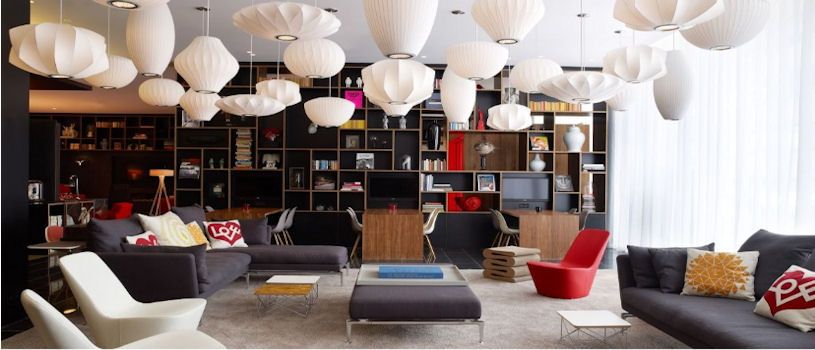Seeing the recent success of low cost airlines, it is not surprising that the low cost business model may be extrapolated to other sectors. In fact, during the last few years, the world of limited service or low cost hotels has become increasingly popular. But not only small hotel chains or singular hotels have opted for this segment, but also large chains have opted for creating a new low cost sub-brand, for example, Marriott and its new brand, Moxy.

In the hotel market, the low cost segment is mostly characterized by offering hotel stays at competitive prices. Within this segment, many of the new hotels are opting for a new concept: the affordable luxury, through which they offer luxury rooms and services at affordable prices.
Most of the guests spend between one and three nights in this type of hotels, since most of them are: millennials or tourists who spend the day exploring the city, although, depending on the location, they are also frequented by families and business people.
But, how do they manage to offer competitive prices? Based on our experience, the hotel factory has identified the key aspects in which these hotels manage to reduce costs:
First of all, the location. Most of the hotels are located on the outskirts of large cities, so the rental price of the establishment is lower. However, these hotels are usually located in areas with good communication in public transport and good complementary services in the vicinity (restaurants, bars, shops, etc.) so that the location does not involve a great inconvenience for the guest.
Secondly, the creation of reduced size rooms. This is possible because affordable luxury hotels are committed to keeping the guest out of the room and they are investing in large open spaces and common areas that encourage socialization. In the same way, to reduce the feeling of overwhelm of the guest inside the room, these hotels favor an efficient distribution, creating bathrooms with an open concept and replacing the walls with transparent glass to increase the feeling of spaciousness.

In addition, the rooms have all the basic needs, but without sacrificing the luxury and comfort sought by the most demanding clients. Hotels opt for efficient construction and design, using elements that are easy to assemble. However, the bed is the most important component of the room and, usually, it is the element in which more money is invested by this type of hotels.
Thirdly, limited service hotels have the least personal possible. Thus, they look for proactive employees, able to perform different tasks. In fact, many of the hotel establishments choose to place the reception near the bar so that the same employees can perform tasks in both departments if necessary.
In addition, to reduce the front desk staff, most hotels opt for the self-check-in, where the guest performs its own check-in through a computer, although an employee will help them if they need it.
However, to make up for the lack of staff, employees strive to interact with the client and make him feel special as well as creating a unique experience.
Finally, they also reduce costs in F&B area. Hotels usually have a grab&go buffet for breakfasts with quality food but little elaborated and food is located in removable trays easy to assemble. They do not offer lunches or dinners on a regular basis, but, for those guests who require it, they offer a la carte food at the bar. This food is made in a Merrychef type oven, which allows them to cook different types of meals with little effort.

Another interesting thing that these hotels use to attract more guests and earn an extra income is to have meeting rooms or coworking rooms. These rooms have the latest technology and they offer the necessary furniture and office equipment. Additionally, some limited service hotels have innovative meeting rooms with differentiating elements, such as the hotel Hoxton, in London, that one of its meeting rooms has a kitchen that may be used to serve both tea and coffee in the afternoon, but also to create dinners and private parties.
After visiting hotels in London and Amsterdam (leading destinations in this segment), the hotel factory has identified three examples of international brands or hotel chains as best in class in this segment:
- CitizenM. It is considered a pioneer in the concept of affordable luxury. Its comes from its target customer, the “mobile citizens”. They are those people who do not want an experience in a normal hotel and they want a room just to sleep but with spacious common areas to have fun.
- Moxy. It is Marriott’s youngest brand and is designed together with Ikea. The brand redesigns the traditional experience of affordable hotels allowing guests to work, play and connect while surrounded by bold design and contemporary style.
- The Student Hotel. It has created a new concept of accommodation for young people that is presented as a hybrid between a hotel and a student residence. In the same building they have hotel units, apartments for short stays and rooms for students, which, during summer months, are marketed as hotel rooms.

In the Spanish hotel market there is little supply and high demand of this type of hotels. In fact, this segment at the Spanish market represents only 3.5% of the total supply (where the Room Mate and Casual Hotels chains stand out, which are from Spain), while in countries like France it is almost a 20%. Therefore, the Spanish market could provide high profitability, compared to the surrounding countries.
That is why many of the large international hotel chains, such as EasyHotel, are betting on Spain in their next investment project and it is expected that, in the coming years, other large companies will join this initiative.
Nowadays, the tourism industry is constantly changing, and the level of segmentation is creating increasingly differentiated and innovative products. At the hotel factory we are in a constant lookout for the main innovations in the hospitality sector to guarantee the customer a product that is clearly differentiated from the rest, and according to the new trends that originate in the market. If you are interested in finding out more about the importance of conceptualization in the hospitality sector and about our repositioning projects, do not hesitate to contact us and ask for advice.









